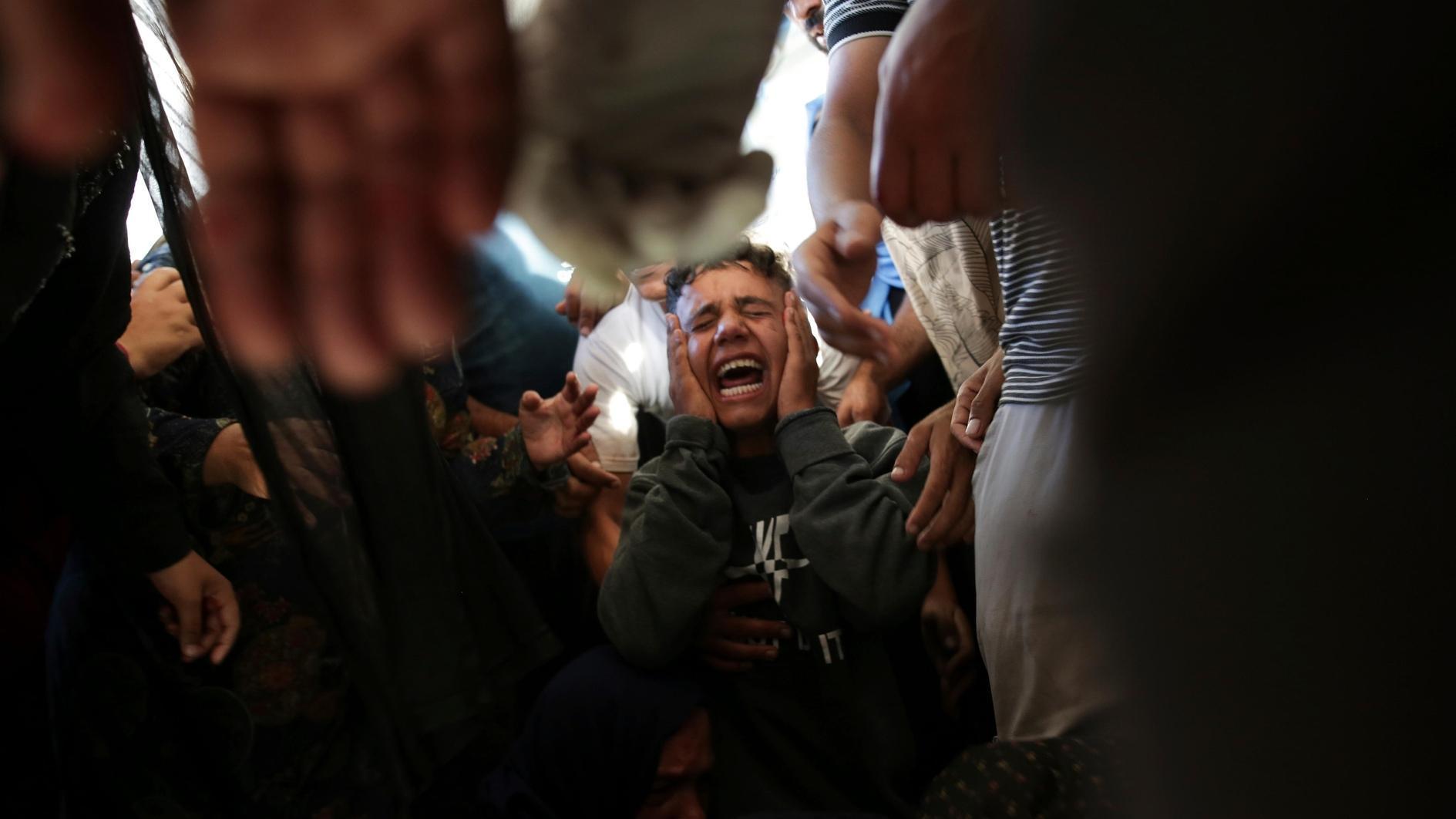
Palestinians mourn their relatives killed in the Israeli bombardment of the Gaza Strip at a hospital morgue in Khan Younis, southern Gaza Strip, Monday, June 24, 2024.
Israel kept up its bombardment of Gaza on Tuesday after Prime Minister Benjamin Netanyahu said the "intense phase" of the war was winding down, as the United States urged its ally to avoid further escalation along the Lebanon border.
Israeli forces launched more deadly strikes, with 13 people killed across two schools and a home hit in Gaza City, according to the Hamas-run territory's civil defense agency.
With Israel planning to redeploy some soldiers from Gaza to the Lebanese border, U.S. Secretary of State Antony Blinken on Monday pressed the country's defense minister not to allow the violence to spiral.
Blinken "underscored the importance of avoiding further escalation of the conflict and reaching a diplomatic resolution that allows both Israeli and Lebanese families to return to their homes," spokesman Matthew Miller said after the meeting in Washington with Defense Minister Yoav Gallant.
There has been daily cross-border fire between Israel and Lebanon's Hezbollah since the outbreak of the Israel-Hamas war on Oct. 7, with fears growing in recent weeks that it could turn into another major front.
In the latest fighting, Iran-backed Hezbollah on Monday said it targeted three Israeli military sites over the border.
Israel's military said its warplanes hit militant infrastructure in the Baalbek area of eastern Lebanon.
Thousands of Lebanese and Israeli civilians from the border areas of their respective nations have been forced to seek refuge away from the fighting in recent months.
"A war must happen to push Hezbollah away from the border," said Helene Abergel, a 49-year-old resident displaced from the Israeli border town of Kiryat Shmona.
'Dragging Israel into destruction'
In Gaza, Israeli strikes have destroyed much of the territory's infrastructure and left residents struggling to survive.
Netanyahu said the military will soon end the "intense phase" of operations in Gaza's southern Rafah, which prompted vast numbers of civilians that had sought refuge there to flee once again.
The development "doesn't mean that the war is about to end", Netanyahu told Israel's Channel 14 on Sunday.
The prime minister is facing mounting protests in Israel for failing to secure the release of 116 hostages seized on October 7 who remain Gaza, 42 of whom the army says are dead.
"I think Netanyahu is dragging Israel into destruction," demonstrator and former spy Gonen Ben Itzhak told AFP.
The premier on Sunday again rejected the permanent ceasefire demanded by Hamas during on-and-off talks involving the U.S. and other mediators.
"The goal is to return the kidnapped and uproot the Hamas regime in Gaza," Netanyahu said.
Israel launched its war on Gaza in retaliation for the Hamas' Oct. 7 attacks that resulted in the deaths of more than 1,190 people, mostly civilians, according to Israeli official figures.
Israel's offensive has killed more than 37,600 people in Gaza, mostly civilians, according to the Hamas-run territory's health ministry.
In Washington, Israel's defense minister was greeted with shouts of "war criminal" by a few dozen protesters as he left the meeting with Blinken.
Gallant also held talks with CIA chief Bill Burns, the key U.S. pointman in negotiations to free the captives.
Gallant emphasised "Israel's primary commitment to return the hostages, with no exception".
Netanyahu vowed in his interview that "we will win", but United States officials have raised doubts over Israel's goal of completely destroying Hamas.
'We are totally trapped'
In southern Gaza, Rafah city centre lies deserted after most residents and people who had gone there seeking safety fled the advance of Israeli troops.
"There is no more water or food. We are totally trapped," said Haitham Abu Taha, among the very few Palestinians who have returned.
Abu Taha, 30, spoke of the "danger of quadcopter drones which mercilessly target anyone walking" in the streets.
The distress of the 2.4 million people in the narrow strip of land that is Gaza, already impoverished before the war, has increased with the fighting.
United Nations agencies have repeatedly warned of dire shortages of vital supplies, while on Monday France and Jordan called on Israel to lift all land-based "restrictions" on aid deliveries.
Philippe Lazzarini, head of the United Nations agency for Palestinian refugees, said "the breakdown of civil order" in Gaza has led to "rampant looting and smuggling".
The UNRWA chief said such instances impede aid deliveries to a territory confronted with "catastrophic levels of hunger".
UNRWA, which coordinates nearly all aid to Gaza, has been in crisis since January, when Israel accused about a dozen of its 13,000 Gaza employees of involvement in the attacks that sparked the war.
Families of those killed in Hamas's Oct. 7 attack inside Israel sued UNRWA on Monday, alleging it facilitated the unprecedented bloodshed, according to court documents.
An independent review of UNRWA, led by French former foreign minister Catherine Colonna, found some "neutrality-related issues" but said Israel had yet to provide evidence for its main allegations.